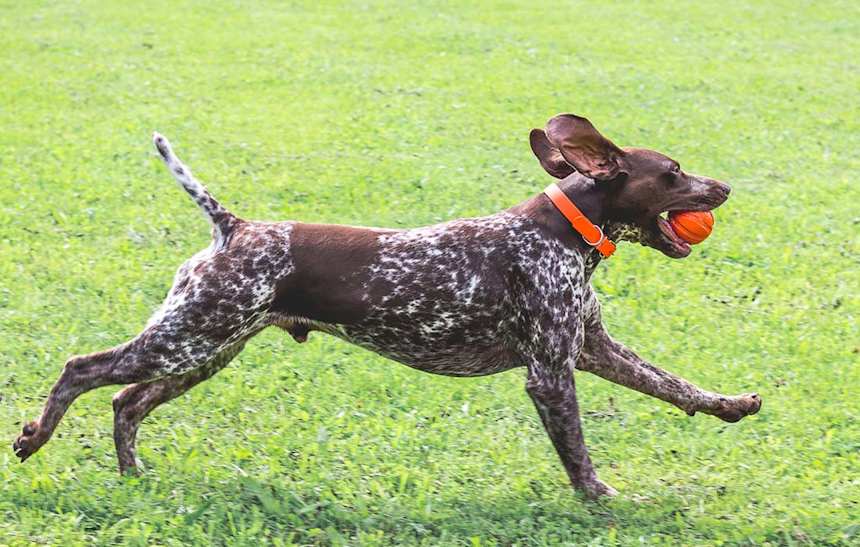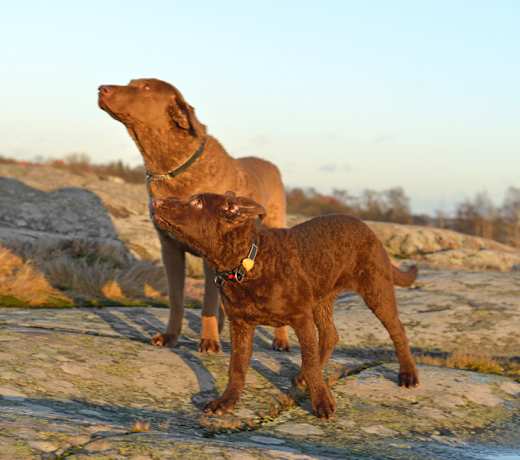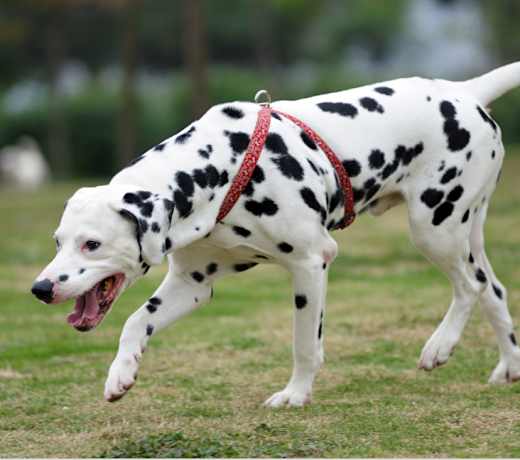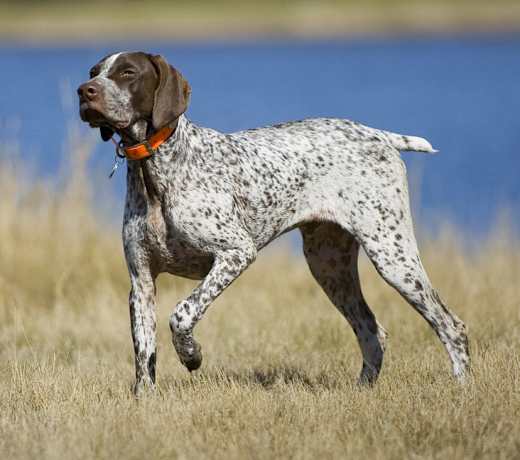German Shorthaired Pointers will grow to be between 22 and 26 inches tall and between 48 and 97 pounds, with males generally being bigger than females.
German Shorthaired Pointer
Breed Type: Sporting
Common nicknames: GSP
Coat: Smooth
Hypoallergenic: No, they will likely trigger allergies.
Temperament: Energetic, playful, intelligent, loyal
Life expectancy: 10-14 years
Color & patterns: Liver

The German Shorthair Pointer, also known as the “GSP,” is a breed known for their boundless energy and athleticism. GSPs are popular family pets, especially for active families who love hiking, running, swimming, and spending time outdoors. With their sleek, muscular builds and short coats, this breed looks like they’re always ready for action. In addition to their non-stop energy, GSPs are highly intelligent and eager to please their parents. They excel at obedience training, and many go on to become skilled hunting dogs. In fact, the breed was originally developed in Germany in the 19th century as a versatile hunting dog capable of tracking game on land and in water. So, if you’re looking for a loyal, active companion who’s always up for an adventure, the German Shorthair Pointer might just be the dog for you.
German Shorthaired Pointer characteristics
Learn about about German Shorthaired Pointer basics like their fur colors, shedding levels, how much grooming they need, and other German Shorthaired Pointer facts.
Average height
21-25 inches (53.3-63.5cm)
Average weight
42-79 pounds (19.1-35.8 kg)
Average lifespan
10-14 years
Exercise needs
Grooming needs
Full-grown size
Good with cats
Good with kids
Training aptitude
What does a German Shorthaired Pointer look like?
German Shorthaired Pointers have sleek, muscular builds and short coats and are known for their boundless energy. Their coats can be solid liver (reddish brown), liver and white, or black. Their coat is usually a mix of liver and white, with some white furs mixed in with the liver or black fur, mostly on the torso. GSPs also have medium-sized, almond-shaped eyes, long muzzles, and broad, high-set ears.
Do German Shorthaired Pointers shed?
Yes, German Shorthaired Pointers are moderate shedders. They have short, smooth coats and shed a moderate amount compared to other breeds. Like most dogs, GSPs shed more in the spring and fall.
Do German Shorthaired Pointers point naturally?
Yes, German Shorthaired Pointers have a naturally strong instinct to point and retrieve. They were bred to be hunting dogs, so these strong instincts come in handy.
What is a GSP dog?
A “GSP” dog is short for “German Shorthaired Pointer.”
How long does a German Shorthaired Pointer live?
German Shorthaired Pointers live to be between 10 and 12 years old.
When do German Shorthaired Pointers stop growing?
German Shorthaired Pointers reach their full height at about a year or a year and a half old but can continue to gain weight and muscle until they are about two.
German Shorthaired Pointer temperament
Learn about about the German Shorthaired Pointer temperament and how well they fit into your lifestyle, home environment, and family.
Are GSP velcro dogs?
Yes, German Shorthaired Pointers are velcro dogs, often following family members around the house. They are quite people-oriented and thrive on human interaction, and are cuddle machines.
Are GSP good guard dogs?
Yes, German Shorthaired Pointers can be good guard dogs. They are loyal to their families and will bark to alert them to strangers or visitors. However, they tend to make better watch dogs than guard dogs because many like people too much to be really good at scaring them away.
Do German Shorthaired Pointers bark a lot?
No, German Shorthaired Pointers don’t bark as much as some other breeds. They typically bark to communicate or alert their parents to something unusual, but they are not nuisance barkers. As with any dog, they can be discouraged from barking as frequently with proper training and exercise.
Are German Shorthaired Pointers good with kids?
Yes, German Shorthaired Pointers are generally good with kids. Like all dogs, German Shorthaired Pointers need to be trained to behave gently with children and vice-versa. Their boisterous energy can sometimes be too much for smaller kids, but they love having young playmates with energy to match their own.
As with any breed, it is recommended that your child is always supervised when interacting with your German Shorthaired Pointer to keep both the child and dog safe.
Can a German Shorthaired Pointer live in an apartment?
While GSPs can adapt to apartment living, they are not typically suited for it due to their size and high energy levels. They do best in homes with ample space and a secure yard with a fence at least six feet tall. GSPs are energetic dogs that require regular exercise and mental stimulation. Young GSPs will become difficult to live with if they are confined and have few opportunities to express their natural exuberance.
Is a German Shorthaired Pointer a good family dog?
Yes, a German Shorthaired Pointer can be a good family dog. They were bred to both hunt and be a devoted family companion, so this high-energy dog is a wonderful breed for a very active family that understands and is attentive to their need for mental and physical stimulation. German Shorthaired Pointers love their humans, and they love playing with young, energetic family members.
Are German Shorthaired Pointers good with cats?
German Shorthaired Pointers were bred for their strong prey drive, an instinct that isn’t always best paired with cats. Of course, each dog has their own preferences and temperament, and if properly socialized to your cat and introduced at a young age, your GSP could get along just fine with a cat.
Are German Shorthaired Pointers good with other dogs?
Yes, German Shorthaired Pointers are generally good with other dogs. However, they can sometimes show aggression towards dogs of the same sex.
Are German Shorthaired Pointers smart?
Yes, German Shorthaired Pointers are considered a smart breed that can learn quickly with consistent training. They are eager-to-please, hard-working, and social dogs. They are adaptable hunters and also perform well in many sports, such as agility, dock diving, and obedience.
Are German Shorthaired Pointers good in cold weather?
No, while German Shorthaired Pointers can tolerate cold temperatures for short periods of time, they are not naturally equipped for most cold weather. Their short, dense coat is designed more for water resistance and quick-drying than insulation.
Are German Shorthaired Pointers high energy?
Yes, German Shorthaired Pointers are high-energy dogs. They need lots of exercise, which can include vigorous activities like running, swimming, hiking, and agility training.
They have a strong prey drive and need pet parents with active lifestyles to guide their energy into positive outlets. GSPs are bred to please their people and hunt, so they don’t like to sit around all day. They need at least a six-foot fence if they’re outdoors unsupervised — they’ll try to escape their enclosure when they get bored.
Are German Shorthaired Pointers easy to train?
Yes, German Shorthaired Pointers are easy to train. They are intelligent, creative, and eager to please, and respond well to positive reinforcement. Most are motivated by food, toys, play, and praise.
Just keep in mind that even if a certain dog breed is known to be easy to train, teaching a dog requires a long-term commitment.
German Shorthaired Pointer history
Learn about where the German Shorthaired Pointer came from.
What were German Shorthaired Pointers bred for?
German Shorthaired Pointers were originally bred as versatile hunting dogs capable of tracking game on land and in water. They are great companions and have great power, speed, agility, and endurance for long days of hunting or running. GSP breeding was so successful that, to this day, GSPs are some of the top-winning breeds in competitive hunting events.
German Shorthaired Pointer health
Learn about about the German Shorthaired Pointer health outlook and what diseases they may be prone to at various stages of their life.
Do German Shorthaired Pointers have health problems?
The German Shorthaired Pointer is generally a very sturdy, healthy breed. Health issues to watch out for include:
Hip and elbow dysplasia: These are two of the most common skeletal diseases seen in dogs. They are similar diseases in which either the hip or elbow joint has grown abnormally or is misshapen. The abnormal shape prevents the joints and sockets from properly meeting one another, resulting in rubbing and grinding instead of sliding smoothly. Unlike in hip dysplasia, where the main problem is joint instability, the abnormalities seen in elbow dysplasia often result in pieces of bone and/or cartilage breaking loose and irritating the joint tissues. Over time, the rubbing from dysplasia can cause a variety of issues, such as pain, lameness, and secondary osteoarthritis. Surgery can be done to fix the joint if diagnosed before the onset of arthritis. If you are rescuing a German shorthaired pointer, have them checked out by a vet to see if they have or are prone to getting dysplasia so you know what they will be able to handle in terms of activities and exercise.
Von Willebrand’s disease: This inherited bleeding disorder results in blood cells being unable to clot properly.
Lymphedema: This disease causes swelling and fluid redemption in the lymphatic system.
Entropion: This genetic defect causes one or both eyelids to be inverted or roll inward and rub the eye, causing scratches. Left untreated, it can lead to decreased vision or complete blindness.
Cancer: This is the leading cause of death in GSPs.
Gastric dilation-volvulus: This is a life-threatening swelling of the abdomen.
Are German Shorthaired Pointers hypoallergenic?
No, German Shorthaired Pointers are not hypoallergenic. It’s important to note that allergens are not only present in a dog’s hair but also in their skin cells, saliva, and urine. Even hypoallergenic breeds can trigger allergic reactions in sensitive individuals. Regular grooming practices such as brushing and bathing can help reduce allergens on a dog’s coat and skin.
How much exercise does a German Shorthaired Pointer need?
German Shorthaired Pointers need at least one to two hours of vigorous exercise per day, ideally split into two parts. This can include walks, hikes, runs, swimming, or other activities. GSPs are smart and athletic and are great at activities that exercise their mind and body, such as field events, agility, obedience, and dock diving.
Popular German Shorthaired Pointer mixes
Some common German Shorthaired Pointer mixes include:
Boxapoint (German Shorthaired Pointer + Boxer)
Pointeraner (German Shorthaired Pointer + Weimaraner)
Sprointer (German Shorthaired Pointer + English Springer Spaniel)

Find German Shorthaired Pointer puppies near you
Adopting a German Shorthaired Pointer
Learn about acquiring a German Shorthaired Pointer - the pros and cons of adopting versus going through a breeder, and associated costs.

Misty
German Shorthaired Pointer
Female, puppy
Canyon Country, CA
House-trained
Spayed or Neutered
Shots are up-to-date

Misty
German Shorthaired Pointer
Female, puppy
Canyon Country, CA
House-trained
Spayed or Neutered
Shots are up-to-date



